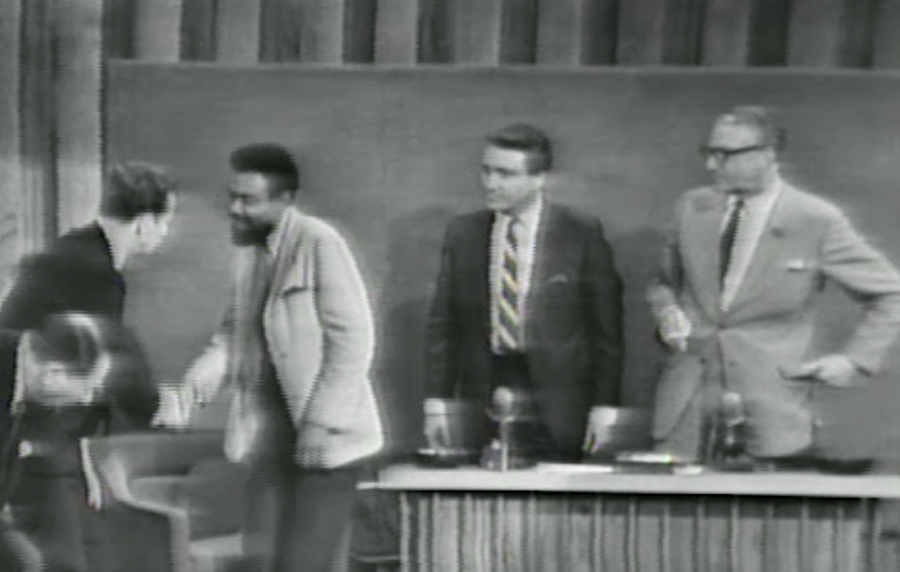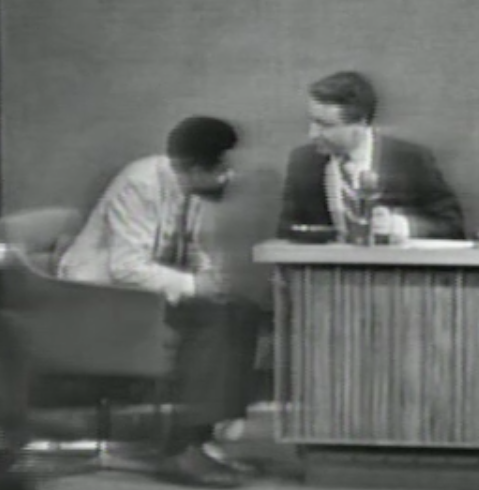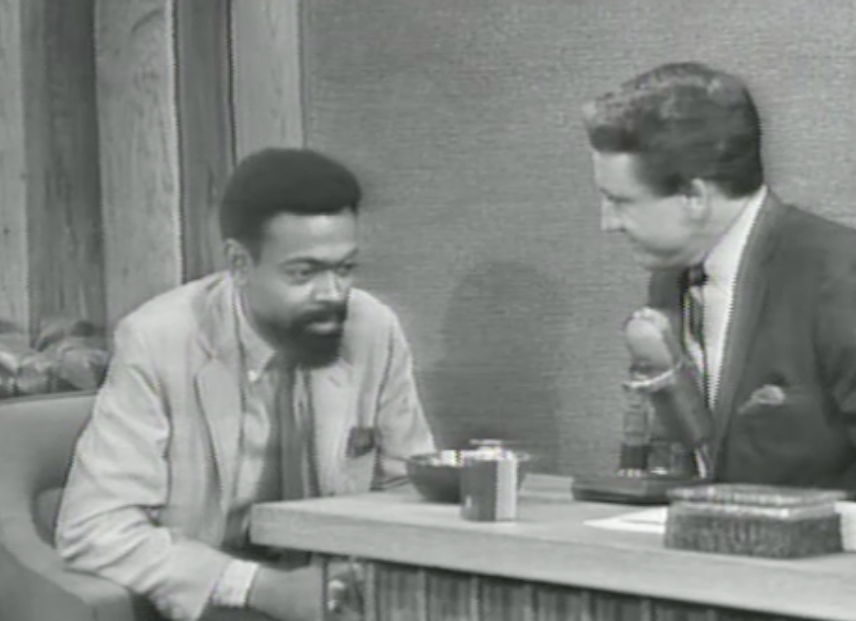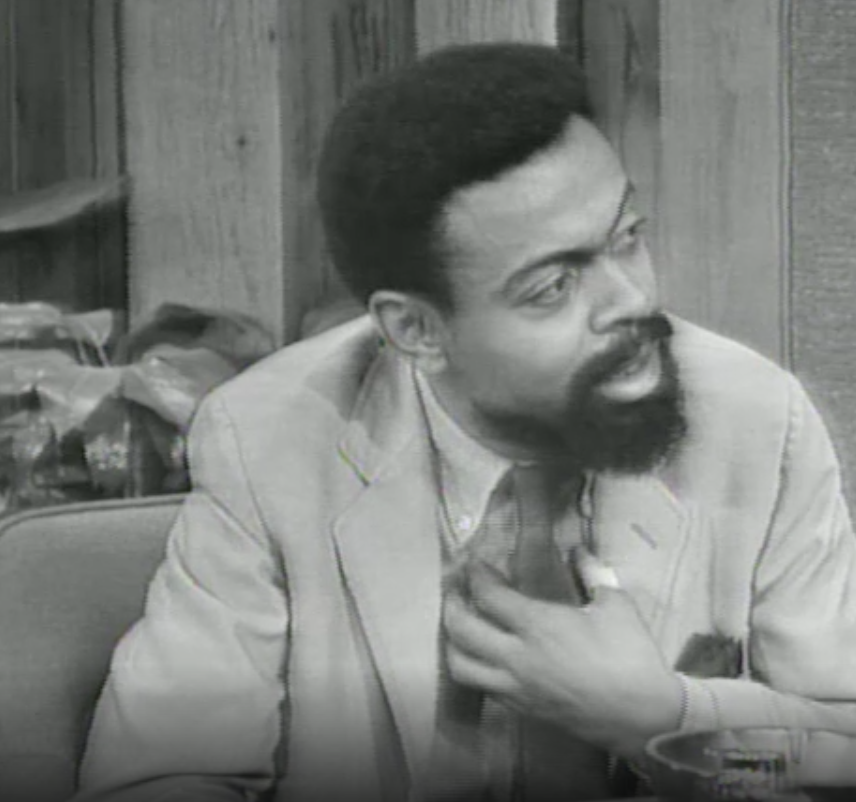
When LeRoi Jones Went on
The Merv Griffin Show
Introducing Harmony Holiday's Disappearing Archive Series
This series will highlight the inchoate and disappearing archives of the African diaspora that exist often uncollected and in disrepair, and will dig into the significance of material—film, TV, vinyl, audio, print—that seems to fly by on the daily reel of replaceable data: footage of dancer Katherine Dunham’s work in Haiti, Amiri Baraka’s neglected Jihad Records, rare Sun Ra recordings and interviews, out-of-print texts by Jeanne Lee, Joseph Jaraman, and other musicians who secretly doubled as poets and writers… all of it at risk of disappearing in our contemporary web of digital surfaces. Writing about our unacknowledged archival data allows us to look at the smallest gestures therein and make of them a new body of diasporic poetics: grammar, music, dance, life, and more.
*
Merv Griffin looks sharp and nervous introducing the man he calls “the most controversial playwright in America today,” while his sidekick puffs his cigarette. A thin and bright-eyed thirty-something black man named LeRoi Jones sidles out from backstage in suit and tie and calmly shakes four ivory hands while the band plays anodyne jazz standards fit for television. LeRoi steps onto the platform, takes his seat, and spins it protectively toward his host, a little askance from the other seated guests.

How are you doing? Merv begins. Fair. LeRoi answers in rapid reflex. What went wrong? Merv pretends concern. Nothing, it’s just a fair day. Small talk big. LeRoi is improvising on live television, refusing the minstrel grin, interrupting Griffin’s formal cadences to make space for honesty, to feel real, to justify the transgression of having accepted the invitation in the first place.

The play he’s newly infamous for is one in which “Clay Clay Williams” a black middle class commuter on the New York Subway meets Lula, a white women who seduces him, and then murders him when he won’t have sex with her on the public train. The controversy is that a black man has been brave enough to suggest that the root of white aggression is black indifference to such advances, that white people’s fear and denial of that indifference is what leads to preemptive retaliation: envy, the deadliest of sins. LeRoi is his play’s leading man Clay, on Merv Griffin’s stage, on live television, poised and ready with casual invectives that might get him killed.
My image of a hero is LeRoi Jones on a talk show in 1965 becoming Clay, becoming Amiri Baraka.
Merv Griffin continues his passive-aggressive small talk, You would give no pre-interview I understand, he says. I just had something else to do, LeRoi replies, a lighthearted muffled laughter—it’s funny to see this white entitlement flexing polite. It’s funny how quickly being called famous comes to mean being owned by the public, the media, a talk show host. Oh, says Merv, flustered by LeRoi’s composure, we’ll just go ahead and wing. I’m going to ask you a few questions, you tell me if I’m right or if I’m wrong… You believe in separation of the races? The intent is to corner LeRoi and get him to say something whimsically evil. Instead he nods at a member of the band he knows and calls out the ridiculousness of the question before the interrogation can gain momentum. What do you mean, they’re already separate… What I said was that I don’t think integration is possible, I don’t think America will be around long enough to integrate all those many people. What’s gonna happen to us? Merv entreats nervously. Well there are people all over the world plotting your murder, don’t you read the papers? Merv interjects… but, we’re… still pretty strong. Not personally, LeRoi promises.
* Watch LeRoi Jones on The Merv Griffin Show here *
Now it’s personal. It’s been less than two minutes since the white talk show host and the black poet and playwright began their fraught conversation. Television wants to give the audience a new black villain: brilliant, young, beautiful, someone spectators can love to hate and use to fuel their fear and criminalization of black creative expression. First lesson, if asked onto a talk show, don’t give a pre-interview—that way they won’t be ready when you say what LeRoi, what Clay, what waking up from a nightmare, said next. Personally as individuals most Americans are weak minded… it’s almost scientific, Americans die from cancer and heart trouble… cancer is a very descriptive disease, the organism trying to spread itself and eat up everything, which is what Americans do. Heart trouble, the sudden loss of the heart. Heartless people… that’s what you are.
Merv goes on to ask clumsily about the great strides of the Civil Rights movement, his best mistake (as if in a country that still hasn’t paid any reparations for chattel slavery, a piece of paper saying black citizens can vote is supposed to be some “great stride,” a generous concession toward integration). LeRoi dismisses this as white America’s attempt at an alliance now that the nation is under siege, that won’t work, he ensures.

It’s like, LeRoi Jones continues, inhabiting his character Clay’s brutalized ghost, the great hero in popular culture is James Bond, a man who’s well dressed, suave, makes it with all the women, and he’s licensed to kill…. Their image of a hero is someone who is licensed to kill. So what they want to do to the black man is give him a license to kill, to integrate him into this Gomorrah that you inhabit. The curtain closes. You almost imagine LeRoi taken away in handcuffs, you almost hope he plays James Bond in the sequel. We don’t know what to want.
My image of a hero is LeRoi Jones on a talk show in 1965 becoming Clay, becoming Amiri Baraka, telling white America they aren’t worth fighting for, dying in their arms to be reborn in ours. If they wanted to make me famous they would have to pay for it, he had once quipped. They would have to pay for it. They would have to pay for it. It’s funny to inhabit a country in which the truth is a form of revenge, an actual weapon the real hero carries everywhere.

And then again, it’s not funny at all. If Hollywood, USA calls you to play the black James Bond or to turn your playscript into a tour of the graveyard shift of the talk show circuit or to perpetrate the myth of integration live on Jim Crow television, it’s ok to send your ghost, it’s ok to change your name. Excessive presence leaves no traces. The looming fame this footage reveals is what killed LeRoi Jones, but like any hero, he came back: the same man but in better form, with even less of a desire to please an industry he was seeking to overthrow.
Harmony Holiday
Harmony Holiday is a poet, dancer, archivist, mythscientist and the author of Negro League Baseball (Fence, 2011), Go Find Your Father/ A Famous Blues (Ricochet 2014) and Hollywood Forever (Fence, 2015). She was the winner of the 2013 Ruth Lily Fellowship and she curates the Afrosonics archive, a collection of rare and out-of print-lps highlighting work that joins jazz and literature through collective improvisation.



















